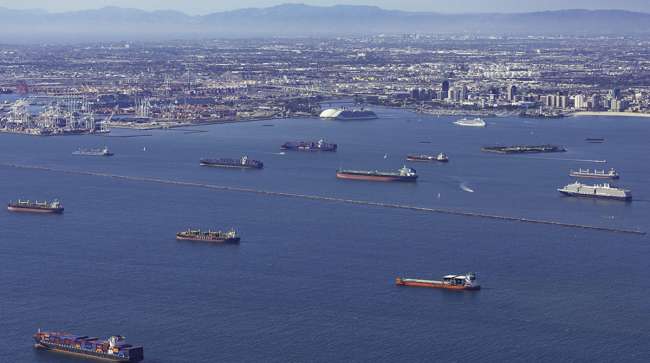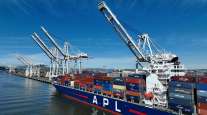Los Angeles Daily News
Port Automation Hurts Economy, Says Study Funded by Longshore Union

[Stay on top of transportation news: Get TTNews in your inbox.]
Automation at the Long Beach Container Terminal and the Port of Los Angeles’ TraPac terminal has eliminated 535,848 hours and $41.8 million in wages annually for dockworkers, even as production at ports that are automated is typically lower than at those that aren’t, according to a new study.
The ports of L.A. and Long Beach, the two busiest in the nation, are also not fulfilling their legal mandate to provide economic and environmental benefits for Californians, according to that 130-page report, which came out June 30 and takes aim at foreign shipping companies and defends dockworkers against increasing terminal automation.
The report, nearly three years in the making, was underwritten by a grant from the International Longshore and Warehouse Union, Coast Longshore Division.

The timing of the study’s publication is conspicuous, as the union and the Pacific Maritime Association are negotiating a new contract — with the existing one set to expire on July 1.
The union-funded study also comes more than a month after a PMA-sponsored study touted the benefits of automation.
The Port of Los Angeles declined to comment. PMA also declined to comment, citing an agreement to refrain from making any related public comments during contract negotiations.
But Mario Cordero, executive director of the Port of Long Beach, defended his port’s benefit to the community.
“The ports have a role in furthering public and community benefits,” Cordero said in a statement, “and I believe the Port of Long Beach is a model of that very stance.”

Cordero
The Economic Roundtable, a nonprofit research group that has been active in L.A. County since the early 1990s, compiled the report, titled, “Someone Else’s Ocean: Shipping and Jobs in the San Pedro Bay.”
Despite the longshore union providing a grant to pay for the study, one of its co-authors, Daniel Flaming, said the report was objective.
“It’s an independent report, so we controlled the content,” Flaming, who holds a doctorate in public policy and has a long background in preparing similar studies, said in an interview. “They (the union) didn’t have any voice in the content.”
Still, the study is largely critical of automation, foreign shipping companies and the ports themselves.
Those findings contrast sharply with the results of the PMA-sponsored study, led by Michael Nacht, a professor of public policy at University of California-Berkeley and a former U.S. assistant secretary of defense. That study found that cargo handling was accelerated, terminal capacity was expanded and longshore work was generated “significantly faster” there than at conventional terminals.
Taken together, though, the dueling reports shed light on some of the most pressing issues at the L.A. and Long Beach ports, which are expected to dominate contract talks — primarily terminal automation.
Both the union and PMA have said they anticipate the discussions to go past July 1.
Flaming and co-author Patrick Burns took “a broad look at the context of port operations,” the former said, including how the ports impact local and state economies, communities and businesses.
Foreign shippers, consolidated into three international shipping alliances, dominate the twin ports, owning nine of the 11 container terminal companies there and handling 81% of the containers that go through the San Pedro Bay.
“Overall, I think we’d like to see more of the community in the L.A. region and in California seeing themselves as stakeholders in the ports,” Flaming said, “rather than the center of interest emanating from these very large foreign shipping alliances.”
Some shipping companies, the report said, want to increase automation and reduce their reliance on American workers — even with doubtful benefits.
The Organization for Economic Cooperation and Development’s International Transportation Forum, the report said, found “that the productivity of automated ports is 7% to 15% lower than for non-automated ports.”
Want more news? Listen to today's daily briefing above or go here for more info
The earlier study came to a different conclusion, saying automation increased growth and efficiency, and lowered costs — while not reducing job opportunities for dockworkers.
Frank Ponce De Leon, ILWU Coast Committeeman, denounced the PMA-sponsored study as a “self-serving document” while Nacht called automation a “win-win strategy.”
Ponce De Leon, in a June 29 statement, did not directly discuss the study from Flaming and Burns — but did urge terminal operators to protect dockworkers.
“It is crucial that the privately operated terminals at our publicly owned ports provide economic security for every worker who moves cargo,” he said, “and support the communities that endure the inevitable downsides of shipping, like traffic and infrastructure costs.”
Distributed by Tribune Content Agency, LLC


